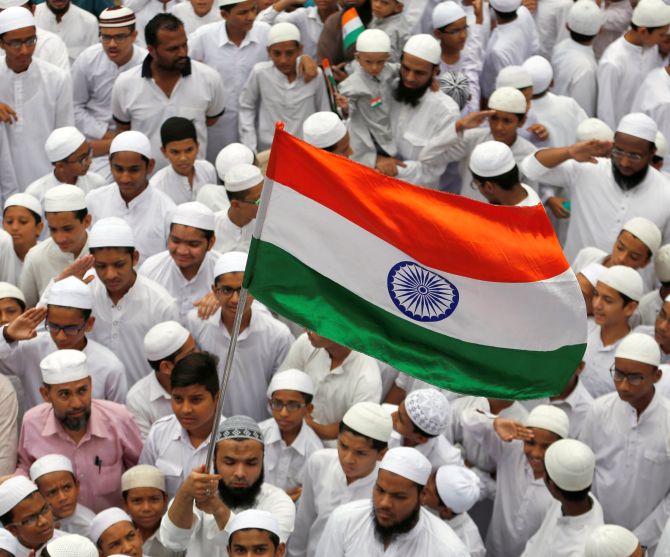TCN News
New Delhi: The National Democratic Alliance (NDA), led by the Bharatiya Janata Party (BJP), has formed the government for the third consecutive time. However, among its 293 Lok Sabha MPs, the NDA lacks representation from Christian, Muslim and Sikh communities.
The only exception is Kiren Rijiju, a Buddhist and former Union minister, who retained his seat in Arunachal West by defeating Congress’s Nabam Tuki.
According to an analysis by The Hindustan Times, the composition of the NDA MPs includes 33.2 percent from Upper Castes, 15.7 percent from Intermediate Castes, and 26.2 percent from Other Backward Castes. In contrast, the INDIA bloc’s 235 MPs include 7.9 percent Muslims, 5 percent Sikhs, and 3.5 percent Christians. Additionally, the INDIA bloc’s composition includes 12.4 percent Upper Castes, 11.9 percent Intermediate Castes, and 30.7 percent Other Backward Castes.
Muslim Representation in the 18th Lok Sabha
Out of the 24 Muslim MPs elected to the 18th Lok Sabha, 21 belong to the INDIA bloc, including two from the National Conference (NC), three from the Indian Union Muslim League (IUML), four from the Samajwadi Party (SP), five from the Trinamool Congress (TMC) and seven from the Congress. The remaining three Muslim MPs include Asaduddin Owaisi of the All India Majlis-e-Ittehadul Muslimeen (AIMIM) and two Independents, Mohmad Haneefa and Abdul Rashid Sheikh.
An analysis by The Indian Express reveals that 11 major parties fielded 82 Muslim candidates, of which 16 won. Five were from NDA constituents, including one from the BJP. BJP’s sole Muslim candidate, Dr Abdul Salam, finished third in Kerala’s Malappuram Lok Sabha seat.
Since BJP leader Mukhtar Abbas Naqvi’s term ended in July 2022, the Council of Ministers under Narendra Modi has not included any Muslim member.
Christian Representation
The BJP’s only Christian candidate in Kerala, Anil Antony, lost in the Pathanamthitta seat. Despite support from the Believers Eastern Church, Antony came third after Congress’s Anto Antony and CPI(M)’s Dr TM Thomas Issac.
However, the BJP secured its first Lok Sabha seat in Kerala, with actor Suresh Gopi winning in Thrissur.
Kerala BJP general secretary George Kurian mentioned that the Christian community backed the party in several seats, including Thrissur. He added while the party has gained some support, it needs to do more to win over Kerala’s Christian community.
Kurian attributed the Congress-led United Democratic Front’s (UDF) success to Muslim consolidation in favour of the grand old party.
Setbacks in Christian-dominated States
The BJP and its allies faced setbacks in Christian-majority states in the Northeast, such as Meghalaya and Nagaland. Assam Chief Minister Himanta Biswa Sarma suggested votes from “a particular religion” contributed to the NDA’s losses in these regions. Despite these challenges, the NDA won both Lok Sabha seats in Arunachal Pradesh.
A Manipur, the BJP leader acknowledged that resentment among tribal and Christian voters contributed to their electoral losses in the region.
Sikh Representation
In Punjab, the BJP fielded six Sikh candidates: Preneet Kaur, Parampal Kaur Sidhu, Ravneet Singh Bittu, Taranjeet Singh Sandhu, Rana Gurmit Singh Sodhi and Manjit Singh Manna.
This was the first Lok Sabha election since 1998 where the BJP contested without an alliance with the Shiromani Akali Dal (SAD). Outside Punjab, BJP’s Sikh candidate SS Ahluwalia was defeated in West Bengal’s Asansol by TMC’s Shatrughan Sinha.
The NDA’s third term highlights both its continued political strength and the ongoing challenge of achieving broader representation from minority communities.


